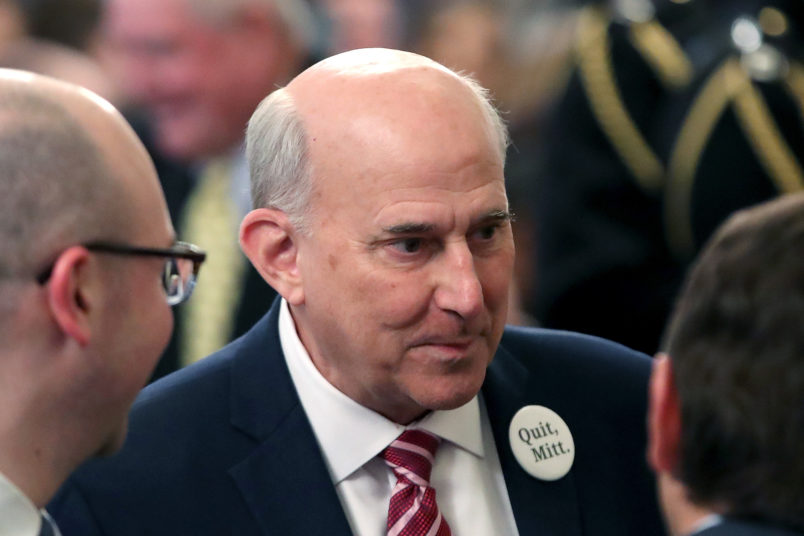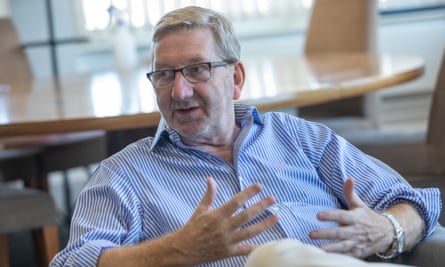Gohmert Says He Will Take Hydroxychloroquine For COVID-19, Flouting FDA Warning

WASHINGTON, DC - FEBRUARY 06: U.S. Rep. Louie Gohmert (R-TX) waits for U.S. President Donald Trump to speak to the media, one day after the U.S. Senate acquitted on two articles of impeachment, in the East Room of th... MORE
By Zoë Richards
|
July 30, 2020 8:43 a.m.
Rep. Louie Gohmert (R-TX) said after testing positive for coronavirus Wednesday that he will take an anti-malaria drug as treatment, flouting the wisdom of experts who have cautioned against its use for COVID-19.
“My doctor and I are all in,” Gohmert said when asked if he had considered taking the hydroxychloroquine during an interview with Fox News’ Sean Hannity on Wednesday night.
Texas GOP Rep. Louie Gohmert told Sean Hannity Wednesday that "my doctor and I are all in," when asked if he had considered a hydroxychloroquine regimen following an announcement earlier in the day that the congressman had tested positive test for coronavirus. pic.twitter.com/xwPONXJc0D
TPM Livewire (@TPMLiveWire) July 30, 2020
Gohmert said that he had received a text from a friend who was a doctor who just found out that he also had the virus “and he started the regimen too.” Gohmert said that he will begin taking the anti-malaria drug “in just a day or two.”
The remarks follow news that Gohmert, who has often refused to wear a mask around the Capitol, announced that he had tested positive for coronavirus.
In spite of warnings from the Federal Drug Administration and his own task force of health experts, President Donal Trump has continued to promote hydroxychloroquine as a treatment for the virus, even retweeting Monday a video that falsely declared the drug was a cure for COVID-19. The video featured Stella Immanuel, a woman who call herself a doctor who has history of making false statements — including a claim that endometriosis is caused by sex with demons in dreams.
In a briefing Tuesday, when asked about doctor whose video was removed by several social media companies for spreading misinformation, Trump said Immanuel’s was a “very important voice” and called her “very impressive.”
In an ABC interview Tuesday, the nation’s top infectious diseases expert Dr. Anthony Fauci said hat he is in agreement with the FDA, who recently revoked the emergency use authorization for the drug as treatment.
“The overwhelming, prevailing clinical trials that have looked at the efficacy of hydroxychloroquine have indicated that it is not effective in coronavirus disease,” Fauci said.
By Zoë Richards
|
July 30, 2020 8:43 a.m.
Rep. Louie Gohmert (R-TX) said after testing positive for coronavirus Wednesday that he will take an anti-malaria drug as treatment, flouting the wisdom of experts who have cautioned against its use for COVID-19.
“My doctor and I are all in,” Gohmert said when asked if he had considered taking the hydroxychloroquine during an interview with Fox News’ Sean Hannity on Wednesday night.
Texas GOP Rep. Louie Gohmert told Sean Hannity Wednesday that "my doctor and I are all in," when asked if he had considered a hydroxychloroquine regimen following an announcement earlier in the day that the congressman had tested positive test for coronavirus. pic.twitter.com/xwPONXJc0D
TPM Livewire (@TPMLiveWire) July 30, 2020
Gohmert said that he had received a text from a friend who was a doctor who just found out that he also had the virus “and he started the regimen too.” Gohmert said that he will begin taking the anti-malaria drug “in just a day or two.”
The remarks follow news that Gohmert, who has often refused to wear a mask around the Capitol, announced that he had tested positive for coronavirus.
In spite of warnings from the Federal Drug Administration and his own task force of health experts, President Donal Trump has continued to promote hydroxychloroquine as a treatment for the virus, even retweeting Monday a video that falsely declared the drug was a cure for COVID-19. The video featured Stella Immanuel, a woman who call herself a doctor who has history of making false statements — including a claim that endometriosis is caused by sex with demons in dreams.
In a briefing Tuesday, when asked about doctor whose video was removed by several social media companies for spreading misinformation, Trump said Immanuel’s was a “very important voice” and called her “very impressive.”
In an ABC interview Tuesday, the nation’s top infectious diseases expert Dr. Anthony Fauci said hat he is in agreement with the FDA, who recently revoked the emergency use authorization for the drug as treatment.
“The overwhelming, prevailing clinical trials that have looked at the efficacy of hydroxychloroquine have indicated that it is not effective in coronavirus disease,” Fauci said.































